Last month, we featured poet, professor, and WFMU radio host Kenneth Goldsmith singing the theory of Theodor Adorno, Sigmund Freud, and Ludwig Wittgenstein — heavy reading, to be sure, but therein lay the appeal. How differently do we approach these formidable theoretical texts, Goldsmith’s project implicitly asks, if we receive them not just aurally rather than textually, but also in a light — not to say goofy — musical arrangement? But if it should drain you to think about questions like that, even as you absorb the thought of the likes of Adorno, Freud, and Wittgenstein, might we suggest Kenneth Goldsmith singing Harry Potter?
Perhaps the best-known modern exemplar of “light reading” we have, J.K. Rowling’s Harry Potter books present themselves as ripe for adaptation, most notably in the form of those eight big-budget films released between 2001 and 2011. On the other end of the spectrum, with evidently no budget at all, comes Goldsmith’s 30-minute adaptation, which you can hear just above, or along with his various other sung texts at Pennsound. Here he sings, with ever-shifting musical accompaniment and through some otherworldly voice processing, what sounds like the final novel in the Harry Potter series, Harry Potter and the Deathly Hallows.
“She tells a good story” — thus has every adult Harry Potter-reader I know explained the appeal of Rowling’s children’s novels even outside of the children’s demographic, especially as they awaited Deathly Hallows’ release in 2007. Having never dipped into the well myself, I couldn’t say for sure, but to my mind, if she tells a good enough story, that story will survive no matter the form into which you transpose it. The Potter faithful hold a variety of opinions about the degree of justice each movie does to their favorite novels, and even about the voice that reads them aloud in audiobook form, but what on Earth will they think of Goldsmith’s idiosyncratic rendition?
Update: Kenneth shot us an email a few minutes ago and filled out the backstory on this recording. Turns out the story is even more colorful than we first thought. He writes: “I was a DJ on WFMU from 1995–2010. In 2007, J.K. Rowling released the seventh and final Harry Potter and the Deathly Hallows. Prior to the book’s release the day I went on the air at WFMU, someone had leaked a copy to the internet, enraging Scholastic Books, who threatened anybody distributing it with a heavy lawsuit. I printed out and sang in my horrible voice the very last chapter of the book on the air, thereby spoiling the finale of the series for anyone listening. During my show, the station received an angry call from Scholastic Books. It appears that their whole office was listening to WFMU that afternoon. Nothing ever came of it.”
Related Content:
Download Two Harry Potter Audio Books for Free (and Get the Rest of the Series for Cheap)
Read Online J.K. Rowling’s New Harry Potter Story: The First Glimpse of Harry as an Adult
How J.K. Rowling Plotted Harry Potter with a Hand-Drawn Spreadsheet
Take Free Online Courses at Hogwarts: Charms, Potions, Defense Against the Dark Arts & More
The Quantum Physics of Harry Potter, Broken Down By a Physicist and a Magician
Harry Potter Prequel Now Online
Colin Marshall writes on cities, language, Asia, and men’s style. He’s at work on a book about Los Angeles, A Los Angeles Primer, and the video series The City in Cinema. Follow him on Twitter at @colinmarshall or on Facebook.



No, no! Don´t want it to be the End of it! Layed down on the floor on a mohairblanket and started listening w/a smile on my face. Love that Music! Suddenly I felt like a Child. Can´t remember my parents ever read fairytales for me but now Iknow what it would feel as. Somewhere after the emerald pajamas I Went up, got a cup of hot tea and a slice of applepie and continued listening. Such a wonderful alive voice!
Even when converted to music, you can’t move away from the fact that Rowling managed to create one of the dullest franchise in the history of movie franchises. Seriously each episode following the boy wizard and his pals from Hogwarts Academy as they fight assorted villains has been indistinguishable from the others. Aside from the gloomy imagery, the series’ only consistency has been its lack of excitement and ineffective use of special effects, all to make magic unmagical, to make action seem inert.
Perhaps the die was cast when Rowling vetoed the idea of Spielberg directing the series; she made sure the series would never be mistaken for a work of art that meant anything to anybody?just ridiculously profitable cross-promotion for her books. The Harry Potter series might be anti-Christian (or not), but it’s certainly the anti-James Bond series in its refusal of wonder, beauty and excitement. No one wants to face that fact. Now, thankfully, they no longer have to.
>a‑at least the books were good though
“No!”
The writing is dreadful; the book was terrible. As I read, I noticed that every time a character went for a walk, the author wrote instead that the character “stretched his legs.”
I began marking on the back of an envelope every time that phrase was repeated. I stopped only after I had marked the envelope several dozen times. I was incredulous. Rowling’s mind is so governed by cliches and dead metaphors that she has no other style of writing. Later I read a lavish, loving review of Harry Potter by the same Stephen King. He wrote something to the effect of, “If these kids are reading Harry Potter at 11 or 12, then when they get older they will go on to read Stephen King.” And he was quite right. He was not being ironic. When you read “Harry Potter” you are, in fact, trained to read Stephen King.
Harry Potter web series full episode in a app